Are you struggling with obtaining marketing-qualified leads? Stuck wondering how you can improve the quality of the leads your campaigns are bringing in?
More importantly, do you wish that you can get in front of the exact companies you want to have a conversation with?
You’re in luck because I have five tactics you can test today targeting those companies you want to get in front of (results may vary)!

Before we get into the tactics, we need to understand the basics. What is account-based marketing?
Account-based marketing or ABM is a B2B strategy where marketers target specific accounts within an industry using personalized campaigns that resonate with each target account.
This makes ABM a powerful tactic to keep in your back pocket. Not convinced? According to Marketo, a study performed by the Altera Group showed that 97% of users surveyed experienced a higher ROI using ABM than other marketing initiatives.
Now that I have your attention, let’s make you an account-based marketing champion.
Recommended items needed before jumping headfirst into an ABM strategy:
- Identify target accounts and personas you want to target
- Understand persona’s pain points
- Have an idea of what channel you will use
- Create or have existing content that addresses pain points
Tactic #1: Make Waves on LinkedIn
If you have dabbled with LinkedIn previously, you may be on the verge of skipping this section. I would wait three more sentences, so I can prove to you this is definitely worth your time.
At Directive, we think and attack LinkedIn differently. You may have had a solid piece of content and the perfect buyer personas. However, you still weren’t seeing successful campaigns and rightfully so got discouraged. All we need to do is re-think how we view LinkedIn.
LinkedIn is not a lead generation platform, but a demand generation platform. It can be a powerful ally in any ABM strategy. The moment we stop relying on LinkedIn for leads and focusing on LinkedIn being the first step in the buyer’s journey, we’ll start to see more impactful results.
The goal with Linkedin should be disrupting the users day while on the platform with a compelling piece of content focused on a problem that your target audience deals with daily.
See an example below:

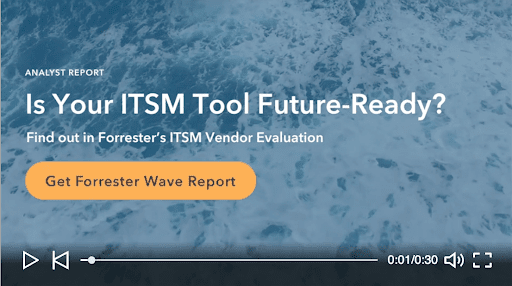
So how does this fit in with our ABM strategy?
Take the target accounts and the persona that you want to get in front of and figure out what is the pain point in their job. Once you know, either create a piece of content or use an existing one that speaks directly to that problem.
Now, using LinkedIn’s Sponsored Content Ads, put all these items together and launch your campaign!
You can take this a step further and split-test using LinkedIn’s Lead Gen Form versus sending the user to a custom landing page.
I recommend using their Lead Gen Form because, while we want to disrupt the user as they are exploring LinkedIn, we don’t want to take them completely out of the platform.
The LinkedIn Lead Gen Form prefills the user’s information and allows them to download the asset to read later, while we can now add them to a remarketing campaign further nurturing them through our conversion funnel.
Tactic #2: Take Advantage of Google Customer Match
Google Ads (formerly Google AdWords) offers a powerful ability to take that prospect email list you have been building and target them across the Google Search Network known as Customer Match.
How does it work?
First, take the email lists you have collected and upload into Google Ads. This list does not have to be all Gmail email addresses.
Upon uploading the list, Google will match (hence the name ‘Customer Match’) the emails provided to a Google account. We have found that their match rate on average is about 80% (results may vary).
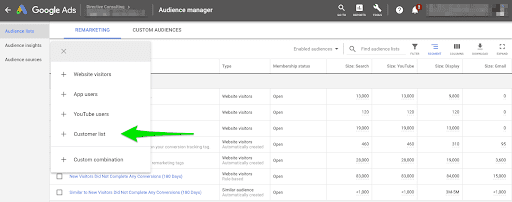
Follow the steps to ensure that upon uploading the CSV file that it is in the correct format.
Now that your list is uploaded, start creating unique campaigns targeting those individuals based on what stage of the funnel they are in.
It is essential to note that this campaign will be very similar to an RLSA (Remarketing List for Search Ads) campaign, in that you will layer the Customer Match audience onto a set of targeted keywords your audience is searching around.
This tactic works best when you have a segmented list of target users in the same stage of your conversion funnel, as you want to use ad copy that speaks directly to that user.
If they already converted on your top-of-funnel CTA, serving them the same CTA won’t be nearly as effective.
Tactic #3: Use the Power of Retargeting
Taking what we learned from tactics #1 and #2, we have a couple of touchpoints with our target users. Most likely this isn’t enough to get them to turn into an MQL.
We need to continue to nurture them through your conversion funnel. The most powerful way to do this is by remarketing.
Let’s say your target user has engaged with you on LinkedIn and read your beneficial post on how your business can solve the problem that’s holding them back from taking next steps.
Congratulations!
You created the demand for your target user to find a solution to the problem you just pointed out. The problem now is they are going to be choosing from a variety of your competitors and you need to ensure you’re the one they remember.
No, not because they get spammed by your ads across the web, but due to your ads continuing to nurture them through the process of choosing the best solution for them.
We have found the most successful remarketing campaigns are the ones that are focused on what stage of the funnel your user is at. These also are the ones that provide added value to the user.
Most advertisers are going to be offering the exact same product offering, the goal is to stand out.
Target your campaigns around informational based search queries that your target user will be searching for. We recommend using Answer The Public to find such queries.
Powerful content pieces that you can use for your top-of-funnel ABM remarketing campaigns could be industry reports generated by Forrester or Gartner.

These tend to be expensive but are highly sought after. If this is not an option, creating a content piece around a problem as outlined in tactic #1 would be your best option.
By using Answer The Public, we uncovered a question that was coming up around, “how to extend ISTM to other departments.” We analyzed the SERPs and found that there was no content addressing this search query. Coordinating with our client we recommended they create a content piece that answers the user’s search query, while we created a landing page illustrating the value of the content piece.
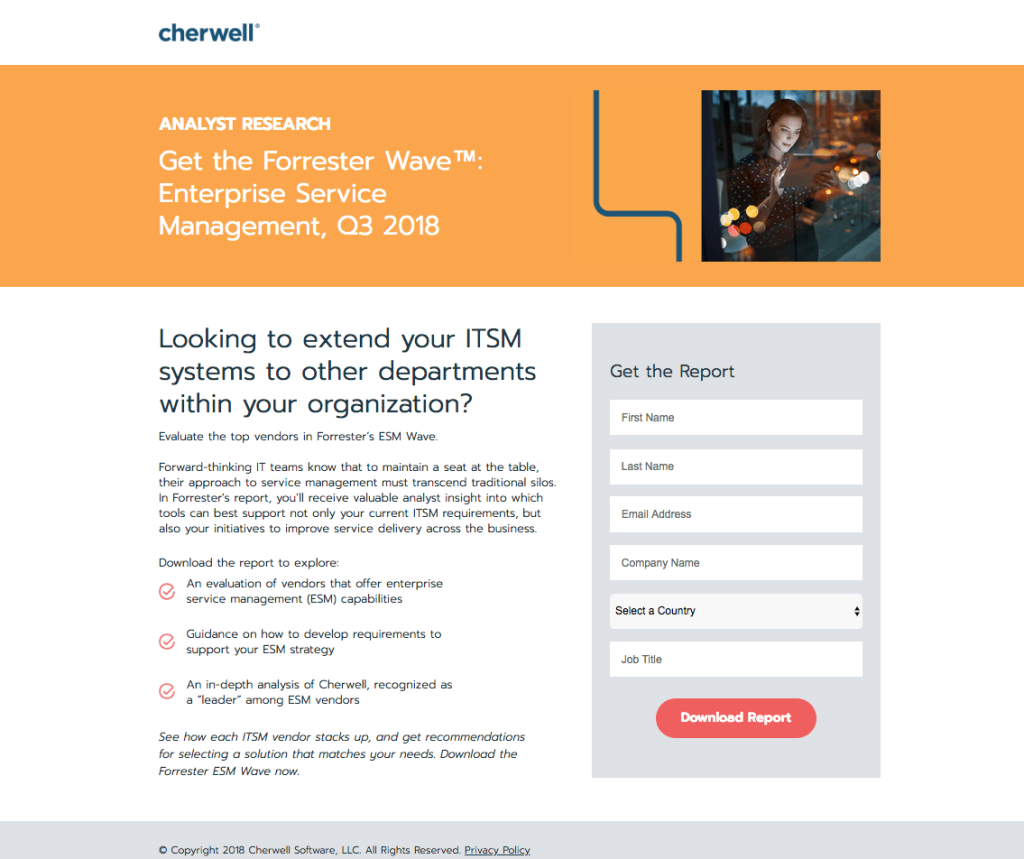
Tactic #4: Look into Third-Party ABM Platforms
There are a handful of third-party ABM platforms that can provide deeper insight into your target audience. For the sake of time, we’ll solely look at DemandBase.
The DemandBase platform allows you to measure the performance of your target accounts and serve them specific content depending on what stage of the funnel they are in and get a deeper insight into topics they are researching.
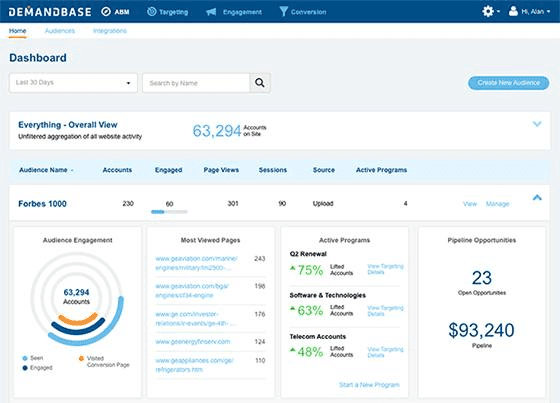
This is powerful information you can leverage into creating new pieces of content to use in your next ABM campaign.
While many ABM tactics are focused on generating net new accounts, it is often more lucrative and cost-effective to focus on existing clients.
What do I mean by this?
Your current clients may be utilizing only one of your product offerings and could be looking into another.
Using an ABM platform, such as DemandBase, helps you have this information at your fingertips. You can see what content your current accounts are engaging with on your website and pass it over to your sales team.
This can give them the ammo they need to start a powerful conversation.
Tactic #5: Promote Your Attendance at Sponsored Events
Have a big conference you’re planning on being at?
This is a great opportunity to get face time with your ABM targets. Take that list of target accounts we’ve discussed in the previous tactics and create targeted campaigns letting them know you’ll be at the conference and entice them to stop by your booth.
Have your design team create a custom landing page detailing where your prospective users can find you at the conference. Take advantage of showcasing the value you can provide!
The CTA of your landing page could be focused around the target user setting up a scheduled conversation with you at the conference. Offering some cool swag doesn’t hurt either.
At a recent conference, the team here at Directive set up a fun marketing campaign where we gave out keys to all who those who visited our booth. We also mailed keys to companies that we want to have future conversations with.
One lucky winner would unlock the lockbox with an Apple Watch found inside.
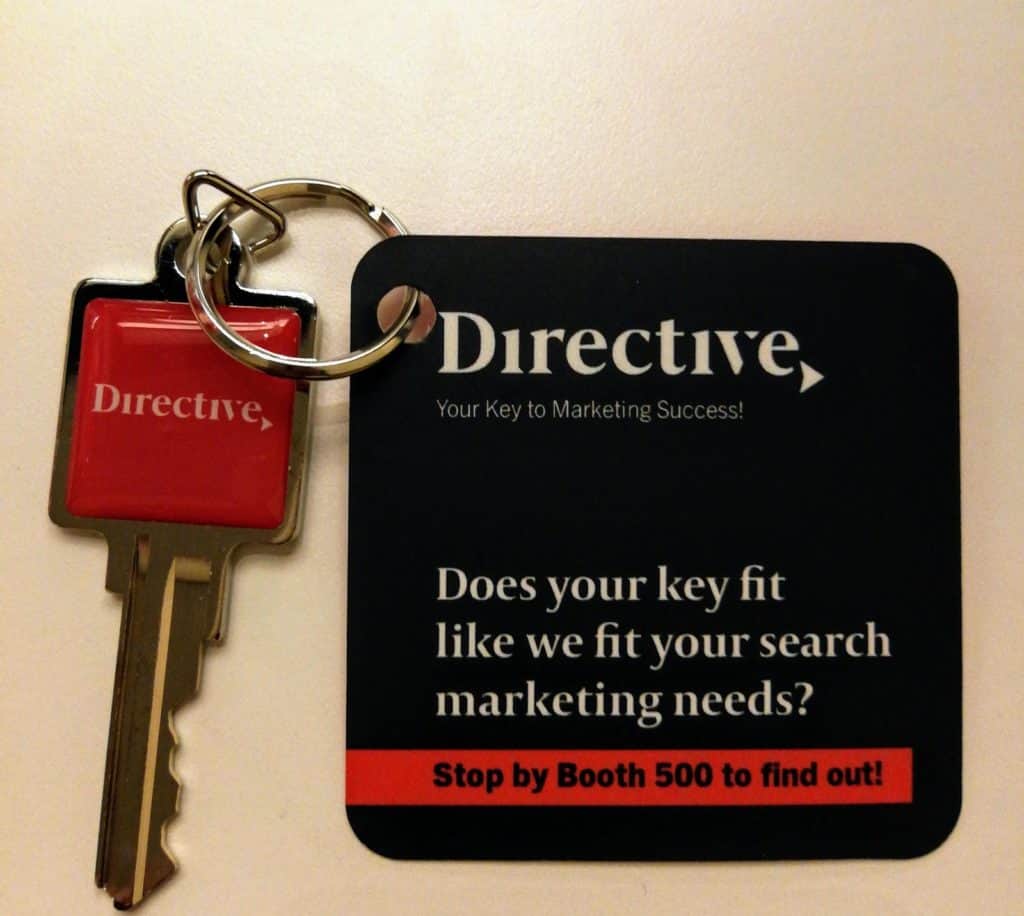
This was a unique ABM strategy where we identified the top businesses that we wanted to communicate with at the event and sent them a key. You can also be cheeky and send your top prospect the one key that unlocks the lockbox. This could earn you some extra bonus points when kickstarting a conversation.
Now back to our tactic, once you have a strategic landing page and your campaigns built you can take this tactic a step further and use IP targeting to get your ads in front of target accounts.
One IP Targeting platform we have used for our client campaigns is El Toro. They give marketers the ability to match physical locations to an IP address, what this means to you is you can target a company’s headquarters to ensure your message is getting in front of decision makers.
You can also use Facebook’s IP targeting feature to the same effect and create campaigns targeting the IP location of the conference. This helps you get in front of your target accounts who may have not seen your previous advertising efforts.
Get Testing!
I hope you’ve been inspired to use these beneficial tools in your day-to-day account-based marketing campaigns.
Remember, the most successful ABM strategies are the ones where your target audiences are well-defined and you have highly-personalized messages and offerings; creating a 1:1 ratio.
By focusing on what business objectives or problems your target audience faces daily and providing that “ah-ha” moment back to them, you’ll gain credibility and trust.
These tactics will help you lay the foundation for a successful account-based marketing campaign. Get out there and make your magic happen.
-
Jordan Matsunaga
Did you enjoy this article?
Share it with someone!

